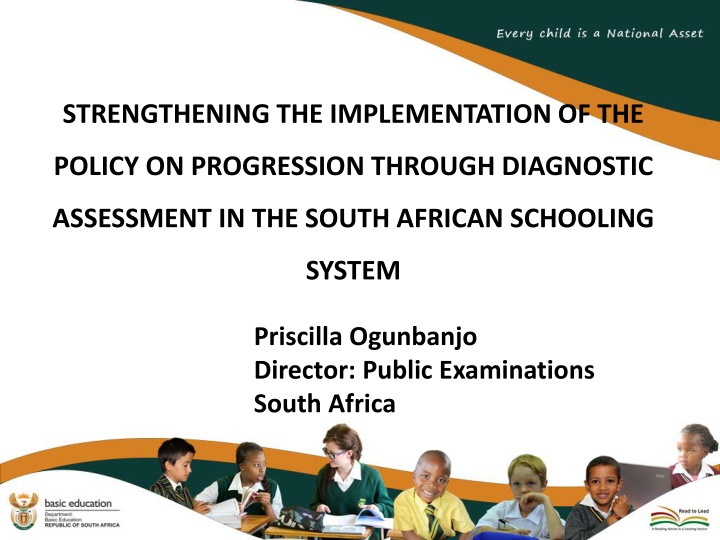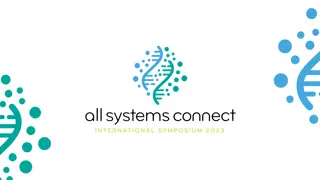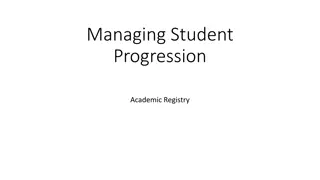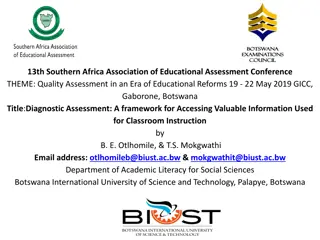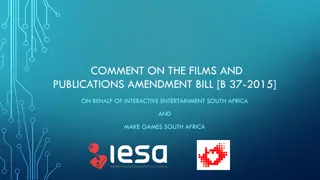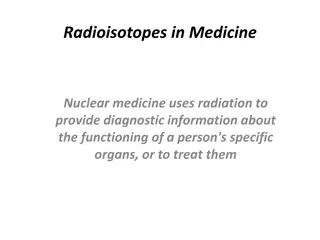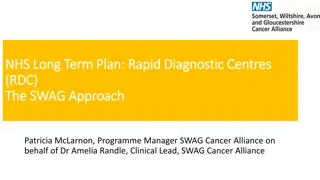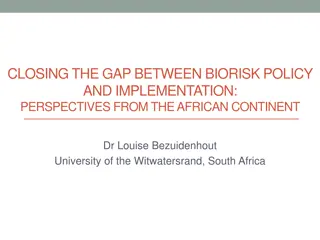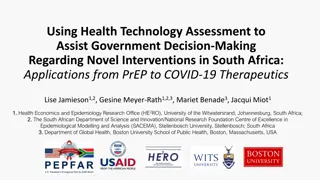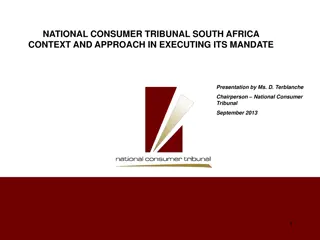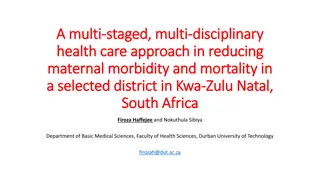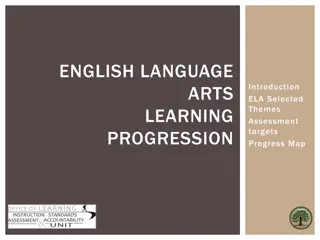Strengthening Progression Policy through Diagnostic Assessment in South Africa
This paper evaluates the implementation of the policy on learner progression in South African schools and suggests mechanisms to enhance it. It focuses on early diagnostic assessments to identify at-risk learners and recommends alteration strategies.
Download Presentation

Please find below an Image/Link to download the presentation.
The content on the website is provided AS IS for your information and personal use only. It may not be sold, licensed, or shared on other websites without obtaining consent from the author.If you encounter any issues during the download, it is possible that the publisher has removed the file from their server.
You are allowed to download the files provided on this website for personal or commercial use, subject to the condition that they are used lawfully. All files are the property of their respective owners.
The content on the website is provided AS IS for your information and personal use only. It may not be sold, licensed, or shared on other websites without obtaining consent from the author.
E N D
Presentation Transcript
STRENGTHENING THE IMPLEMENTATION OF THE POLICY ON PROGRESSION THROUGH DIAGNOSTIC ASSESSMENT IN THE SOUTH AFRICAN SCHOOLING SYSTEM Priscilla Ogunbanjo Director: Public Examinations South Africa
OUTLINE OF PRESENTATION Introduction, Problem Statement and Background 1 Policy on Progression and its Challenges 2 Early Diagnosis as a Mechanism to Mitigate Progression 3 Diagnostic Process 4 Implementing Alternation Strategies 5 Preliminary Recommendations & Conclusion 6
INTRODUCTION This paper is part of a larger study which is intended to evaluate the implementation of the policy on learner progression in South African schools and to devise mechanisms to strengthen the implementation of the policy. This paper focuses on the development of a model of an early holistic diagnostic assessment to identify learners at recommendations regarding alternation strategies. risk and to make
PROBLEM STATEMENT How can the implementation of early diagnostic assessments improve the implementation of the policy on progression in South African schools?
THE SOUTH AFRICAN SCHOOLING SYSTEM a) It comprises 12/13 years of schooling b) It is structured into two bands and comprises the following grades: Foundation Phase: Grade R to Grade 3 (3/4 years) Intermediate Phase Grade 4 to Grade 6 (3 years) Senior Phase Grades 7 to 9 (3 years) General Education and Training Grade 10 to Grade 12 3 years Further Education and Training
THE SOUTH AFRICAN SCHOOLING SYSTEM 12 655 436 learners Grappling with high 425 090 teachers drop-out rates 25 741 schools South African Schooling System Estimated 800 000 write the NSC examination on an annual basis 1 200 000 enter the system at Grade 1 annually
SOUTH AFRICAN SCHOOLING SYSTEM a) Curriculum structured per phase, but divided into grades b) A learner is expected to attain certain key outcomes at the end of each phase, c) If a learner fails to meet the promotion requirements of the phase in three years, he/she is allowed one additional year, d) After 4 years in a phase, learner can be progressed to the next grade and the next phase, without satisfying the requirements of the current grade/phase.
Policy On Progression and its Challenges
Policy on Progression a) In terms of the Regulations pertaining to the National Curriculum Statement Grades R-12, promulgated as Notice No. R1114, in Regulation Gazette No. 9886 of 28 December 2012, a learner may only be retained once in the Further Education and Training Phase in order to prevent the learner from being retained in this phase for longer than four years. b) Policy on Progression has been applied in the GET band since 2005 and did not attract attention. However, the implementation of this policy in the FET band in 2013, has attracted much criticism.
Policy on Progression (c) Progression policy has since been reviewed and limited since 2016, and the following criteria now added: - - Must pass four of the seven subjects Must pass Language of Learning and Teaching (LoLT) Must have attended school on a regular basis Must have complied with the School Based Assessment (SBA) requirements in all subjects - -
In the News Progressed learners' could affect Progressed learners' could affect matric pass rate matric pass rate Progressed matrics 'not coping' Education system must be overhauled to prepare matriculants Three matric pass rates?! Sowing confusion about pushing up pupils Education system must be Education system must be overhauled to prepare overhauled to prepare matriculants matriculants Innovation needed to boost matric results Innovation needed to boost matric results 11
Criticisms/Challenges relating to the Policy on Progression Failure to offer support to progressed learners in large classes Lack of uniformity in application of policy Learners do not cope with demands of new grade Dropping of standards
Performance of Progressed Candidates- National Progressed Candidates Provinces Wrote (all 7 subjects) 2 853 3 502 4 901 5 356 7 681 4 315 2 850 691 Entered 10 937 5 288 13 574 27 653 23 254 13 698 7 432 2 314 Achieved 1 373 2 213 3 367 3 026 3 670 2 433 1 516 365 % Achieved 48.1 63.2 68.7 56.5 47.8 56.4 53.2 52.8 Eastern Cape Free State Gauteng KwaZulu-Natal Limpopo Mpumalanga North West Northern Cape Western Cape 3 280 1 862 788 42.3 National 107 430 34 011 18 751 55.1 13
Specific Limitations of the Current Model of Progression No diagnosis is done to establish the nature and extent of the learning deficiency. Learning deficits are left unattended for a number of years before any form of remediation is implemented Results in Cumulative Cognitive deficit (CCD) Remediation is not based on diagnosis and it s the same for all progressed tutoring/classes) learners (extra
Cumulative Cognitive Deficit Cumulative Cognitive deficit (CCD) implies that children who are deprived of enriching cognitive experiences during their early years are less able to profit from a new and enriched environmental situation because of a mismatch between their cognitive maturity and the requirements of this new, more advanced learning situation. (Gindis, 2013)
Early Diagnosis as a Early Diagnosis as a Mechanism to Mechanism to Mitigate Progression Mitigate Progression
Early Diagnosis This research paper proposes mechanisms that will address the challenges associated with the implementation of the progression Policy. These include: Early diagnosis holistic diagnosis Alternation strategies
The Diagnostic process (a) The diagnostic process involves conducting an analysis or survey of the various components which could be barriers to learning, ranging from: intrinsic factors within the learner (person variables) extrinsic factors (environmental variables). outside the learner
The Diagnostic Process Prentresultaat vir learning barriers Source: Adelman and Taylor (2006:38)
The Diagnostic Process a) A number of these environmental variables are applicable to most progressed learners in South Africa b) Schools with the highest number of learners qualifying for progression are found in schools of low poverty rankings: poor socio economic conditions poor infrastructure poor teaching economically deprived households. c) Diagnostic Techniques must assessments, tests and sources of evidence and data that will provide information on the learner holistically. include a range of
Sources of data for the Diagnostic Process a) Academic record b) Behaviour record c) Biographical details Academic needs Living environment Learning style Area of focus Individual self-assessment c) Psycho Educational Assessments Projective test Memory Test
IMPLEMENTING ALTERNATION STRATEGIES
Feuersteins Theory of Modifiable Ability The Feuerstein theory of structural cognitive modifiability (SCM) and mediated learning Experience (MLE) describes intelligence as dynamic and modifiable , it is not fixed , but rather modifiable . The assumption here is that individuals can be changed in terms of their cognitive processes in a structural way. Further human beings are viewed as open systems, accessible to change throughout their life spans, and responsive to conditions of remediation, provided that the intervention is appropriately directed (in quantity and quality) to the individual's need . This assumption justifies the need for intervention and remediation in learning.
Early Diagnosis a) The Screening, Identification, Assessment and Support (SIAS) Policy promulgated in 2014 is aimed at improving access to quality education for vulnerable learners and those who experience barriers to learning for whatever reason including family disruption, language issues, poverty, learning difficulties, disability, etc. (SIAS DBE: 2014). b) SIAS policy advocates screening of learners at the beginning of each phase. c) SIAS protocol: class teacher must screen all learners at admission as well as in the beginning of each phase d) Findings recorded in the Learner Profile and consolidate information from different sources to provide a full picture of the learners profile
Alternation Strategies The SIAS Policy advocates a support principle where the focus of support should no longer be only on the diagnosis and remediation of learning deficits in individual learners. But shifted to a holistic approach where a whole range of possible barriers to learning that a learner may experience (such as extrinsic barriers in the home, school or community environment, or barriers related to disabilities) are considered. The following are examples of alternation strategies that can be adopted for progressed learners or at risk learners:
Diagram SIAS Process AAdmission,completionofvulnerabilityassessmentandlearnerprofile BNorisksorconcernsidentified Noadditionalsupportrequiredatthisstagewhichrecommendsactiontobetaken. C Atrisklearneridentified.RefertoSBST D clear.Investigatefurthergiven,monitoredandreviewed ESupportneedsclear.Support Supportneedsnot F readslearnerprofile,screensandconductslearnerandNo parentinterviewstoinformlessonplanningrequiredatthisstage I Barrieridentified.Parent(andlearner)consultations. Individualsupportplan(ISP)supportstrategydrawnupand implemented.Mayincludereferraltosocialservices,clinicetc. orrequestsforassistancefromtheLSEorcounselor. GSupportsuccessful. additional Teacherobserves,conductsclassroomassessment, support HNoconcernsidentified. No additional requiredatthisstage support JSupportsuccessful Noadditionalsupportrequiredatthisstage K requestsassistancefromSBST Supportunsuccessful.Teacher LSBSTexaminescase.Recommendsfurtherassessmentwhichisconductedand/orsupportwhichisgiven, monitoredandreviewed.Parentandlearnerliaison MSupportsuccessful. Noadditionalsupportrequiredatthisstage OCBSTreviewsSBSTactionanddrawsupownaction(recommendsthatsupportaccessedatinstitutionlevelOR referstoDBSTforimplementation.)Getparentalconsent. PSupportsuccessful. Noadditionalsupportrequiredatthisstage NSupportunsuccessful. SBSTrequestsassistancefromCBS QSupportunsuccessful. CBSTmakesrecommendationtoDBSTfor outplacementorstrategicplanning R DBSTexamines.Approves,approveswithconditionsorrecommendsdifferentsupportwhichis given,monitoredandreviewed.Parentandlearnerliaison
A holistic approach to alternation strategies Verwante prent http://www.learnnc.org/lp/pages/3300?ref=search
TRIALLING THE DIAGNOSTIC AND ALTERNATION STRATEGIES
Proposed Methodology Two equivalent samples of schools from the same poverty rankings will be identified. Sample A: 5 schools (Control) Sample B: 5 schools (Experimental) Both samples must have learners with similar learning difficulties. The focus will be on learners who failed Grade 10 and progressed (promoted) to Grade 11.
Proposed Methodology (contd) Implement the holistic diagnostic process, SIAS process and Alternation Experimental Group. strategies in the The current practice will continue in the Control Group. Track their progress from Grade 11 to 12 and their performance in the NSC exam at the end of Grade 12 Compare the performances of the Control and Experimental Groups at the end of Grade 12.
PRELIMINARY RECOMMENDATIONS
Preliminary Recommendations Learners should not be progressed from one grade to another or one phase to another simply by looking at the number of years spent in a grade or phase. Thorough diagnosis of the root cause and the aggregate causes/reasons for their underachievement must be determined so that there is a holistic plan for remediation and support. a) b) Remediation is not the drilling in current content. The learning deficits and the intrinsic and extrinsic variables must be identified and addressed. c) Since foundational competencies are so important for further learning, learners who are not competent in Numeracy and Literacy, should not be allowed to progress until those competencies for the level are acquired.
Preliminary Recommendations d) The SIAS Policy is implemented currently only in terms of learners with special needs, but not applied in main stream schools, where learners are experiencing learning difficulties, inclusive of progressed learners. e) Once Alternation strategies achievement of learners must be tracked to determine to what extent the alternation strategies have been successful and determine at what stage the additional support should be terminated. are applied, the
CONCLUSION (a) The literature review points to a preference of early diagnosis and alternation strategies that can address the learning deficits, rather than a continued implementation of progressing learners. The Department of Basic Education will undertake this research project which entails the following: The evaluation of the implementation of the policy on progression across schools from different poverty rankings. A deeper study of other countries, that have high drop out rates and how they deal with learners that continuously fail to achieve the targeted outcomes. Trialling of diagnostic and alternation strategies in a sample of schools. Based on this study, clear recommendations will be made on addressing the current policy on progression. (b) (c)
